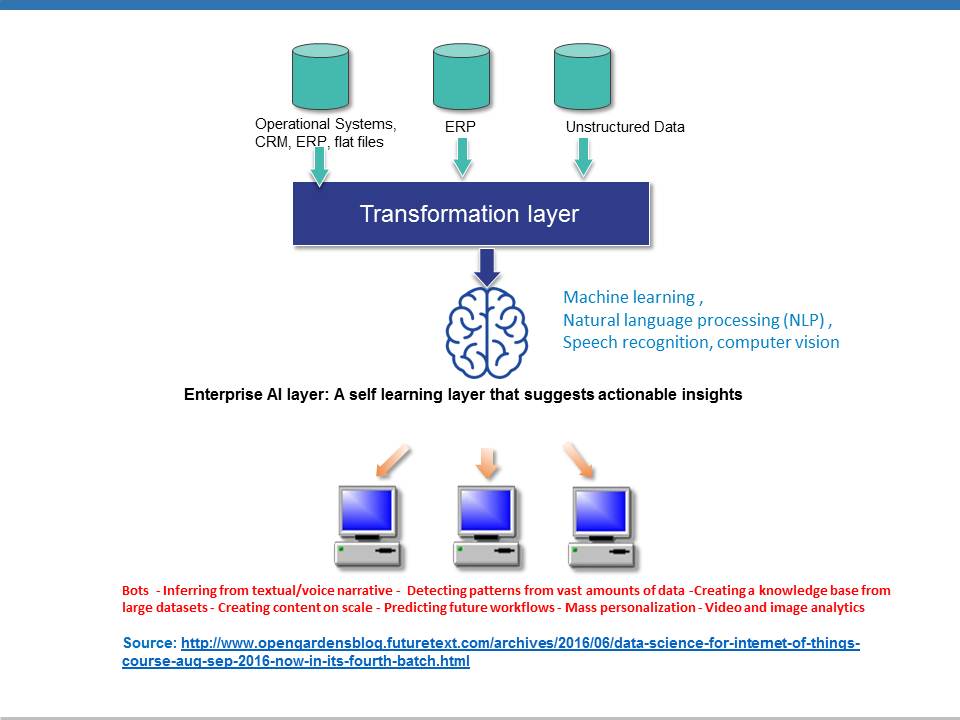
Background
Dresner advisory services has published a report on IoT business models. This report covers IoT, Big Data and Analytics. I have been focussing on this subject in my teaching at Oxford University and the Data Science for IoT course . So, it’s nice to see the insights. Forbes has written a good analysis of this report’s findings. Based on this analysis, I find that the report has some areas I agree but also some surprising omissions. I suspect that the report was based on from survey results – and hence innovation is missed. For example, the inclusion of Map reduce for IoT is surprising (and I suspect arises from familiarity of survey respondents). For the same reasons, ‘Relational Database support’ is seen to be very important, whereas ‘Real time’ is much less so according to the survey. This is similar to asking a group of Telecom Operators in 2005: ‘Will Skype succeed?’ All would say no .. but the reality does not reflect survey findings. Having said that, there are many other findings and trends that I agree with.
Focus on the Enterprise is correct – but is only part of the story
Emphasis on the Enterprise
The emphasis on the Enterprise is accurate. For IoT, consumer gets lot of traction – but the value is in the Enterprise.
However, the word ‘Enterprise’ also encompasses many areas – and each of these verticals have their unique intricacies. If IoT analytics (data) is the main value-add for IoT, then the question is: How will IoT data will be leveraged in an Enterprise considering IoT itself comprises of multiple silos? In a recent article, I advocated an Enterprise AI layer which will incorporate IoT datasets.
Such a layer is likely to be the best way to integrate the currently small and diverse IoT data into the Enterprise and also cope with the very large data volumes in the near future. So, the emphasis on the Enterprise is only part of the story
Data As a Service
The report says: “Sales and strategic planning see IoT as the most valuable today. Strategic planning’s prioritization of IoT is also driven by a long-term focus on how to capitalize on the technology’s inherent strengths in providing greater contextual intelligence, insight, and potential data-as-a-service business models.”
As a service data model for IoT is valid. As per a blog from Gartner – IoT creating Data as a Service DaaS opportunities : “The moral of the story is that organizations should seize the opportunity to grab all the gold (data) and create the rules (algorithms and analytics) they can, both to benefit businesses and scenarios they are already focused upon but also to potentially create new data brokerage businesses. These new offerings may be adjuncts to their core competencies, enabling them to reap the benefits that the IoT revolution is bringing. There are packaged providers, there are evolving marketplaces, there are crowdsourced collections, and there are many basic building blocks an erstwhile organization can implement to capture, manage, slide, dice and provide data brokerage offerings.”
This advice is valid – but will companies spend money speculatively on getting hold of all the IoT data they can if it does not have immediate business payoff? I doubt it. This again leads to the idea of the Enterprise layer for IoT which has a much more tangible payoff
Data warehousing
Finally, the report emphasises Data Warehousing – but does not say how and why existing Data warehouses will work with IoT. The report says “Data warehouse optimization is considered critical or very important to 50% of respondents, making this use case the most dominant in the study“ Again, in the Enterprise AI article, I advocated that the Enterprise AI layer could be seen as an intelligent Data Warehouse
To conclude – Enterprise relevant for IoT – but only with AI
‘Enterprise IoT’ encompasses many areas – each of these verticals have their unique intricacies. If IoT analytics (data) is the main value-add for IoT, then the question is: How will IoT data will be leveraged in an Enterprise considering IoT itself comprises of multiple silos? IoT is also a complex domain and there are many differences between traditional Data Science and Data Science for IoT.To actually implement Data Science for IoT at an Enterprise level, you would need to consider Enterprise AI layer which will incorporate IoT datasets.
